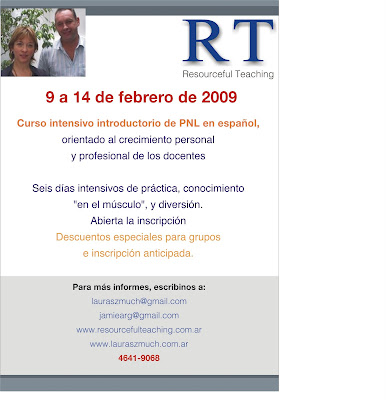Ten years of NLP and working with teachers
So, what have we been doing for the last ten years in Buenos Aires with NLP?
Those of you who have followed us over the years will know that we have been working with many different aspects of teachers work, helping them to become more efficient, creative and successful both in their personal and professional lives.
Apart from teaching the basics of NLP at Practitioner and Master Practitioner level, we have given many talks on workshops both nationally and internationally on topics such as: managing change, really listening, the map is not the territory, being a successful coordinator, leading with values, the help of a coach, time management, creativity, learning styles, motivation, beliefs, reaching all our students and many, many others, a list of which can be found on our website www.resourcefulteaching.com.ar
We have also run courses on presentation skills, language using techniques of NLP and other wonderful topics related to personal and professional growth, always ensuring that those attending have acquired abilities beyond mere information.
When we celebrated our tenth anniversary, and in fact, this is a whole year of celebration, we had meetings with lots of our students and former students and we evaluated the ways NLP had helped them to improve and develop both their teaching and presenting skills and their skills of coordinating.
NLP offers both information and deep learning, learning in the muscle, and we do that by working not only with recipes for success, but also with the inner landscape of our minds.
What do we do in our minds to be able to take action in this way or in another?
The most important technique and objective in NLP is that of Modelling, which is learning from those who do things well, with a high level of excellence. In many cases our students have directly modelled the skills of another person so as to be able to achieve their dreams and get what had previously seemed unobtainable.
We are always delighted to get your feedback as regards HOW you put these ideas into practice. It is very rewarding and motivating for us to hear that such and such tip or topic we dealt with, we don't know how many years ago, triggered a very positive change in your careers and life… when someone tells us, "Oh, after that session I decided to open my own institute", or "I decided to go back to University", or "I noticed what I had to do to make my institute grow" we feel we have done a good job.
We are not interested in telling people WHAT to do, but in showing a different perspective, another way to see a situation, and in this way helping them find how to do something differently and get the results they want.
NLP works with the deep structure and the surface structure at the same time.
What do we mean by this?
The N of Neuro makes sure the information gets both to the right and to the left hemisphere of your brain, that it is processed multisensorily, therefore we pay a lot of attention to how we use our senses.
The L of linguistic is connected with both verbal and non-verbal language, with conscious and non- conscious messages that we might be sending without realizing.
And the P of Programming refers to the habits, routines, assumptions, and beliefs that drive our behaviour. The software of our minds.
You already know that if we know ourselves better we have more chances to communicate with others more efficiently, achieve our goals and make a contribution to the world.
If you have started learning NLP already, you know what we are talking about. And we say "started", because the wonderful thing about it is that we never stop learning.
If this is your first approach, or one of your first encounters with NLP, one of the things you are going to love about it is that things become easier, clearer, and we get wonderful results pretty fast.
And, as we have said before, it is not a question of just reading or listening to us. It is a question of putting things into practice, "living" the knowledge.
The sooner you start, the easier it becomes. The sooner you see results.
People who have already decided to take the reins of their own growth, both in their personal and their professional lives, are a fantastic example that shows us that everything is possible if we take the appropriate steps to achieve it.
© Resourceful Teaching 2008


